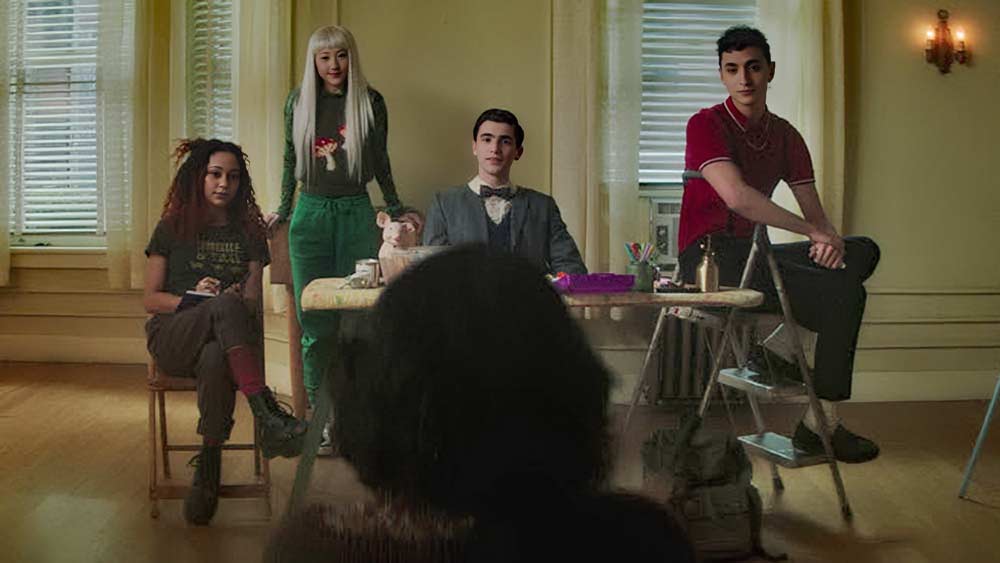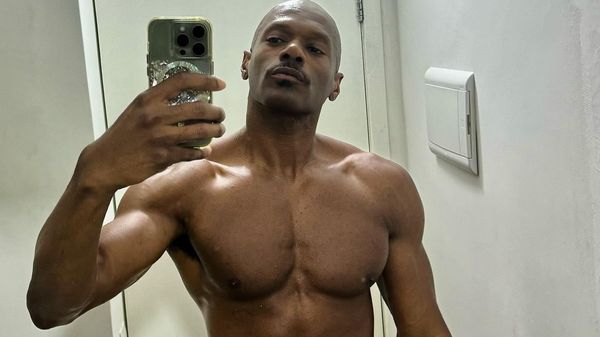August 21, 2011
John Cameron Mitchell on Mattachine
Brody Brown READ TIME: 13 MIN.
For the past three-and-a-half years, filmmaker John Cameron Mitchell has been throwing his monthly dance party Mattachine at Julius' Bar in New York City's West Village. This year, Mitchell, along with the party's co-hosts and DJs Amber Martin, PJ DeBoy, and Paul Dawson, have packed up their party pants and hit the road, embarking on a West Coast mini tour that concludes this weekend with an event in Los Angeles.
We reached out to Mitchell to ask him a few questions about steering his Mattachine machine into the city of Los Angeles. However, we ended up finding out about his views on everything from the weightier topics, like the negative impact Grindr has had on gays and the self-respect issues that currently plague the young people of the queer community, to the fluffier stuff, including finding out about his favorite slow dancing tunes and pick song of the summer.
Enjoy this sampling we can provide of some of Mitchell's thoughts here and check out Mattachine when it rolls into town and onto the dance floor of La Cita Bar in downtown LA this Sunday. And for goodness sake...if you don't know what the Mattachine Society is, pick up a history book! Get reading!
Mitchell on Mattachine
EDGE: Are you excited to bring the Mattachine party to the city where the Mattachine Society was first formed?
John Cameron Mitchell: The answer is yes.
EDGE: You did Portland as well, correct?
John Cameron Mitchell: Yes, on our tour we did Denver, San Francisco, Portland and now LA.
EDGE: For some people on the West Coast who have never heard of your Mattachine parties, a lot of them do a sort of double take and ask, "Wait...John Cameron Mitchell is throwing a dance party? As in the John Cameron Mitchell?" What initially drew you to throwing this sort of party?
John Cameron Mitchell: Well we've been doing it in New York for three-and-a-half years and the impetus was we didn't like gay bars anymore. We were just tired. They started getting more and more similar with the same thump-thump-thump four-on-the-floor beat and everybody looked the same, everybody was texting, nobody seemed to want to be there. It seemed to have lost its individuality. Gay used to mean non-conformist and it seemed to be becoming more conformist: same Gaga, Madonna, Britney remixes, same bodies, same hairstyles, same everything and kind of ageist.
For us, queer was James Baldwin and Liza Minnelli and Little Richard and it covers the gamut, and musically as well. We basically created a night where we would want to be, where we could see all our friends, where all ages were welcome. We did it at the oldest gay bar in [New York] that had the oldest gays. We play a lot of old music so those guys feel comfortable as well as the young guys. We play a lot of soul music, a lot of classic rock, and country; in my opinion, you can dance to all kinds of music.
We discourage texting. We discourage A.D.D. DJing where people play 15 seconds of one song and then 15 of another. It's like what a gay bar was before the Internet, even before Stonewall in a way.
EDGE: Los Angeles' gay community often gets a bad rap for being too superficial and almost brazenly ignorant of and out of touch with queer culture and history, even moreso than other gay communities around the country. Do you find any bit of truth to that generalization, particularly when comparing LA to a city like New York?
John Cameron Mitchell: I think in general, in New York too, young gay people seem to have no idea of their queer history, the variety of queer history that happened before them, the people that broke ground to allow them to be free, to love who they want to love. You know it's like Harvey Milk was only heard about because of the Hollywood movie, for some young people.
It's like AIDS. It's a question mark for many of these young people. Community is about Grindr rather than a place where you could go to get support, to get humanity, in terms of helping out people. San Francisco still has that kind of thing, that social justice. Whereas queer culture is more about what's hot, who to fuck, how many times you're going to check your Facebook. It's like going somewhere and being on your phone the whole time and wondering if something better is happening elsewhere. We fucking hate it. And it breeds rudeness and a kind of A.D.D. callousness that repels us.
Mattachine is all about getting back to the coziness, not necessarily just gay too-a mixed crowd is always better for me-queer is a state of mind, rather than a 'sexuality'. We have all kinds - straight people, trannies, bi -you know whatever. My audience has always been that. Hedwig, Shortbus, it's always been a nice mixed crowd. This is an extension of those projects. Shortbus began as a dance club called Shortbus that I ran in the early 2000s. That was the kernel of it. We did it a few times a year and when we were auditioning we had a big dance party for all the people that were called back and had a giant game of Spin the Bottle with 100 people. That's our aesthetic. And slow dancing adds to it. You know, those things you never got to do when you were thirteen and you were queer. Straight people don't even do that anymore. Slow dancing with somebody? It's a totally different vibe. You have to be there. You're dancing with people. You're not just dancing alone and wondering what's happening elsewhere.
No A.D.D. at Mattachine...and Slow Dancing.
EDGE: Mattachine bills itself as a party that "promotes ethical homosexual culture," so what or who do you think are the enemies of ethical homosexual culture?
John Cameron Mitchell: I think the cellphone can be an enemy of that. When you have to look somebody in the eye, when you have to talk to someone instead of text them. An example is when you're walking down the street and neither one of you look at each other and you both do that thing where one goes right and the other one goes the same way and you keep doing that? The easy way to just avoid that is to just look at someone in the face and then you make an agreement about which way you're going to walk. That's an example of a lack of respect.
I feel a kind of lack of self-respect and respect for others in the queer community lately, especially in the younger queer community. And I think a symptom of it is unsafe sex. Not thinking about the other person, not thinking about yourself, and just fucking without a condom. It's symptomatic of an A.D.D., not thinking about the past, not thinking about the future, barely thinking about the present, way of thinking about life. And it's not just a queer thing. But as Harry Hay said, polysexual culture can be useful to the population at large. One of the things we know, we understand that male and female energies are in all of us and to bring them out and develop them and to cultivate them into beautiful art and a kind of beautiful lifestyle personal way of being that tries to avoid the pure male energy of just domination and war and the pure female energy of just not asserting yourself-not that that's true of female energy but in our culture, women are considered second class citizens- the true human energy is a mixture of male and female energies, however you define them. And that is ethical, that's moral. That actually makes the world a better place as opposed to just fucking everyone in sight and being selfish about your life. You can fuck everyone in sight with respect too [laughs].
EDGE: You definitely can!
John Cameron Mitchell: But there are ways of doing it without respect: unsafely, using it as an addiction, using it as a replacement for other creative things in your life [...] it's filling a hole rather than a beautiful balance. And we want to remind people that there's a great power in coming together in the same space and looking at each other in the eye and just smiling and putting down the phone and not worrying about documenting the experience, actually living it. Nowadays young people document it before it happens. And they hope that they'll feel it later when they look at the photographs of the event. There's a hope of a delayed experience. And that's weird.
EDGE: Why won't someone hear someone like Lady Gaga at your dance party when her music seems to uphold a lot of the tenets Mattachine stands for like the opposition to "fascist body culture" and "age phobia"?
John Cameron Mitchell: I've got nothing against her as such, what I have a problem with is people saying because you are gay, you must listen to this music and this music only. That's what I hate. That's why we avoid clich�s. It's just boring. The Beatles are fantastic but they're so overplayed.
EDGE: Thank God! They so are, no one ever says that! It's like they're sacred; you can't say anything against them.
John Cameron Mitchell: Yeah I'll play a weird Beatles song but there are plenty of places that play the standard bullshit. I get really bored with it. But one of the songs in a context after a reggae song, after a soul song, then it suddenly has meaning again. So we just avoid clich�s. We remind people of The Buzzcocks and Little Richard, that we're queer too and Dolly Parton is as gay as you can get. It's just like, shake it up kids, wake up. There's all kinds of music you can dance to and it makes your body do different things that you don't expect. One slow dance is worth a thousand Gaga songs right now for me as a human being. Which doesn't denigrate the modern gay icons, there's just so much more that you don't remember or you don't hear much of.
EDGE: Okay then what's currently your favorite song to slow dance to or put on for a slow dance ?
John Cameron Mitchell: Either I would say lately maybe "Beth" by KISS. Recently I played "Weekend in New England" by Barry Manilow. Also, "Turn Off The Lights" by Teddy Pendergrass is probably the most perfect slow dance ever made. "Simply Beautiful" by Al Green. We've got a bunch of them.
DJ JC Mitchell on Nightlife
EDGE: George Michael recently said that "gay men's relationship with dance music probably doesn't end at the same time as straight people's does." Do you think that's true?
John Cameron Mitchell: I don't know. You know you go to Europe and thump-thump-thump, four-on-the-floor is the standard music for all people, gay or straight. Anywhere in Europe or Russia, so I don't know if that's true. But we're also forgetting there's all kinds of dance music. You know, our grandparents can dance in a different way and that dancing goes on forever, right? Ballroom dancing, salsa has a huge following of all kinds of people in San Francisco and certainly in Latin culture, dancing is for everybody, all ages. And the black communities. So I think you have to think about the culture, you have to think about the kind of dancing. In terms of four-on-the-floor stuff that's probably true, that gay folks have that kind of history. I think it's because disco came out of marginalized cultures: gay, black, New York, Latino, and a place where you could be safe, there could be a communion. Sylvester is sort of the apothesis of that: the first tranny drag queen superstar and it was a loving one. It was community, it didn't become faceless and computerized until a bit later.
EDGE: Looking at the mainstream gay nightlife landscape, which is so frequently divided and organized by age, race, and body type; I know it's something you try to target a lot, so do you think ageism is a discrimination that's inherent in our community?
John Cameron Mitchell: I think because the community is so based on sex, and certainly when AIDS hit there was a horror, a fear of death. And going to the gym and stuff was a way of denying that there was mortality; you know, "I am strong and not dying." But in general I think that there is an obsession with youth that's more intense in the queer male community certainly more than the female because there's the way many men, most men access sex is visually. So it's like body parts separated from a person, separated from emotions at times. And when you have a lot of men doing that, there can be an obsession with the body and with youth and an over emphasis on it as an important thing in life.
The body is very important and sexuality is very important but to sever the body from the mind and the spirit...there's a danger that it will shrivel up and die, your brain and your heart atrophies, while you keep going to the gym and "oh my God, must stay young, must stay young." That's a losing battle eventually you don't stay young and then you're like, "what have I cultivated other than my body and my looks?" You know that's the LA clich�, obsession with body manipulation and plastic surgery, desperation for meaning. How many churches and small cultures have started in LA, culture of the body, church of the body, new age church, that "what do I do now?" Because a lot of the industry there is based on dreams that are ephemeral, money, fame, those things come and go. They're not necessarily stable things. That's a generalization, but you do find in LA-San Francisco has it's own version of that-but you have a kind of obsession with the body more than other cities in the US. And it's a losing battle, you might as well start to get comfortable with yourself. Give yourself an individual look if you want, fabulous. But to say that it's all over after thirty, God, you might as well kill yourself.
EDGE: You sort of had Grindr in the crosshairs earlier [in the interview], is it fair to say that you think the success and popularity of online hook-up sites have negatively impacted gay nightlife and gays' ability to interact with one another when they're out?
John Cameron Mitchell: I think it's true. I think it is exacerbated in the gay community but you see it in all communities, just the kind of fear of looking somebody in the eyes when they're looking at a screen for so long and theoretically. In Shortbus we kind of invented Grindr before Grindr. I had a character who uses this thing called Yenta, this handheld device that would tell you if there was someone was nearby with a compatible profile. It malfunctions because it interacts with an old man's pacemaker and almost kills him and then they end up talking unexpectedly. And he ends up talking to this 80-year-old guy who's the former mayor of New York and they have a moment and they kiss and it's very tender.
For me I think technology can be a tool but it's such a crutch now. Theoretically it can be hot to think about a hookup that's very specialized, but when it's a business transaction like that? When it's like, what are your stats, this is what I'm into, what are you into? It's like, what happened to what are we into? Good sex is surprising. It's like, whoa, I didn't know I'd be into that. But with this guy he's so into it that I'm into it. Now people are so rigid, you know top, bottom, who's the bottom. Come on, everybody knows that the best sex, those kind of roles can flow a bit. It's so business-oriented, it feels like Wall Street. Plus it makes people mean, they cut them off or they don't respond, peoples' feelings are hurt, it's really hard. It can work for some, but I think it's just a hard knock life there, you know?
EDGE: Is LA the last stop for the Mattachine tour?
John Cameron Mitchell: For this mini tour yeah. We'll be doing more for sure. We're going to be in San Francisco and Portland in the Fall. We've been asked to do Mardi Gras in the New Orleans. I think Paul and PJ, my co-DJS from Shortbus have been asked to DJ at Southern Decadence too. We're hoping to do a Berlin gig. So there will be more. I'm working on other stuff too so it's kind of when I'm free.
EDGE: Assuming that Katy Perry's "Last Friday Night" isn't your favorite summer song, do you have a favorite summer song this year? Or a song of the moment?
John Cameron Mitchell: I do. It's an Australian song actually. It's "Learnalilgivinanlovin" by Gotye.
The song that's a huge, crazy-making song at all our Mattachines is a song from the seventies which is "Tell Me" by Sylvester, which is a hoot and a half.
EDGE: Which are you better at, DJing or dancing?
John Cameron Mitchell: Oh I don't know. I do both. When we have the four of us, we DJ at the same time - tag team. So there's no planning it's just "Oh my God, what's next?" So when we're not actually playing a song we're dancing and having a blast.





